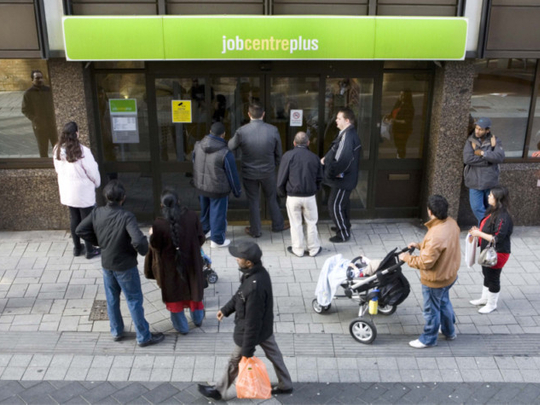
London: UK jobseekers come back from the job centre in the same mood — a kind of anger that only comes from humiliation. Everyone standing in line feels too good to be there, but still thinks everyone else was scum. The assistant might be patronising, but they can cut your income with a click. You can scroll through vacancies, but you’re strangely on your own. How can an organisation designed to help people leave them feeling so isolated?
Loneliness haunts UK’s public services. The entire system is based on linear relationships between the individual and the state. It doesn’t really do community. This poses particular problems when you’re helping people find work. When 80 per cent of jobs are not advertised, job centres only offer a tiny pool of opportunities, in which around one million unemployed young people are now struggling to stay afloat.
Modern life demands better. The welfare state was born in a world without the web; now it’s dealing with a generation of digital natives who have Facebook profiles before they finish primary school. They’ve grown up seeing the power of social networks, connections and relationships. For most young people, job centres feel like entering a bureaucratic labour camp from another age.
Then of course not all networks are equal. Middle-class people take their contacts for granted. The work experience opportunities, the cousin who works in the City, the neighbour who happens to be a lawyer, the friends of friends. But the hard to reach are by definition outside of these social circles. Isolation is particularly a problem for the unemployed, who lose their connection to colleagues. Once excluded from these communities, the job centre does very little to let you in.
But in a tiny office space in south London, a small social enterprise called Participle wants to change all that. Its new project, Backr, is a LinkedIn-type service that offers vulnerable young people face-to-face mentoring, training and advice, and connects them with employees working in their field of interest, often in their local area.
“What we’re doing isn’t rocket science,” says Daniel Dickens, director of start-up enterprises at Participle.
“I get frustrated we can’t do more. That [job centre] wouldn’t be good enough for my children. Why do we think that’s good enough for others?”
Backr starts with a website, but that’s just the door you walk through. It’s different from LinkedIn because you’re invited to “meet ups” where you can connect with people with shared interests. You can also join “boosters”, which offer short-term training or work experience opportunities. A network of trained volunteers called “reflectors” are available to meet in person to offer advice or help prep for an interview. Once you get through the jargon, it seems promising.
Backr started with a small pilot last year, then won a £1m (Dh5.8 million) grant from JP Morgan to expand the scheme to anyone over 18 across the capital. After visiting colleges and job centres, it has 150 people signed up and has held networking events on food, design, technology, retail and care. If it works, the idea is that people who find work through the organisation will stay on to become mentors and contacts for others.
Samina Talaty, 19, a mother from Tower Hamlets, was one of the first to sign up. “It’s like talking to a friend,” she says. “I could just sit and talk to her [the reflector] without worrying about my language. If it was more intense, I’d be like ‘leave me alone’ and just back off. That’s just my opinion. I don’t work with being forced.”
This touch of humanity works. Hilary Cottam, principal partner at Participle, believes that our job centres are built on an over-simplistic economic model “without any real understanding of psychology”.
If you don’t do what we say, we’ll cut your benefits; if you do, we’ll reward you with payments. The system forgets that what motivates us is often neither carrot nor stick, but a human desire for meaning, for work with purpose, for self-direction.
Others are also taking this approach. The Spanish social media recruitment website Jobandtalent has just designed a new app that allows companies to advertise and recruit via Facebook. Future First, the organisation that builds networks of alumni in state schools to help young careers, continues to expand.
Of course with the number of job vacancies falling in the recession, Backr’s job will not be easy particularly as it begins to grow. In all of the success stories, the people I spoke to hadn’t actually found their opportunities online, but through meeting, talking and texting with Backr employees. One young person I got to try out the service exclusively online said it “wasn’t as helpful as other job hunting sites”. And if Backr scales nationally with volunteers, this attentive, personalised service might be harder to replicate.
But something about Backr is spot on. Too often the welfare state does things to people rather than with them. It treats people as problematic individuals, rather than as part of a society that could offer more. It works through transactions rather than relationships. The hope is the welfare system will be open enough to learn these lessons.







